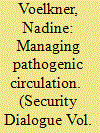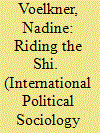| Srl | Item |
| 1 |
ID:
106365


|
|
|
|
|
| Publication |
2011.
|
| Summary/Abstract |
This article traces the emergence of human security as a situated political strategy for managing the circulation of pathogens relating to Burmese migrant communities in Thailand. Specifically, it focuses on the intricate and productive interplay of a range of human and non-human elements that helped to bring forth and shape the vernacular micropolitics of human security. The article documents the techno-(bio)political mechanisms of the human security intervention in two of Thailand's provinces. By enframing, ordering and depoliticizing the complex health world of Burmese migrants in terms of simple dichotomies in which 'unruly' nature (pathogens, diseases, bodies) is contrasted with human techno-scientific ingenuity (scientific evidence, technological innovations, managerial effectiveness), these mechanisms render the circulation of pathogens amenable to biopolitical governance. It is here argued that in the struggle to manage pathogenic circulation, human security transforms the issue of migrant health into a technical matter concerned with the (self-)management of bodies and the governmentalization of the Thai state to the exclusion of important but difficult questions concerning a violent politics of exclusion.
|
|
|
|
|
|
|
|
|
|
|
|
|
|
|
|
| 2 |
ID:
169947


|
|
|
|
|
| Summary/Abstract |
How can a microbial approach to global health security protect life? Contemporary infection control mechanisms set the human and the pathogenic microbe against each other, as the victim versus the menace. This biomedical polarization persistently runs through the contemporary dominant mode of thinking about public health and infectious disease governance. Taking its cue from the currently accepted germ theory of disease, such mechanisms render a global city like Hong Kong not only pervasively “on alert” and under threat of unpredictable and pathogenic viruses and other microbes, it also gives rise to a hygiene and antimicrobial politics that is never entirely able to control pathogenic circulation. The article draws on recent advances in medical microbiology, which depart from germ theory, to invoke an ecological understanding of the human-microbe relation. Here, while a small number of viruses are pathogenic, the majority are benign; some are even essential to human life. Disease is not just the outcome of a pathogenic microbe infecting a human host but emerges from socioeconomic relations, which exacerbate human-animal-microbial interactions. In a final step, the article draws on Daoist thought to reflect on the ways that such a microbial understanding translates into life and city dwelling.
|
|
|
|
|
|
|
|
|
|
|
|
|
|
|
|